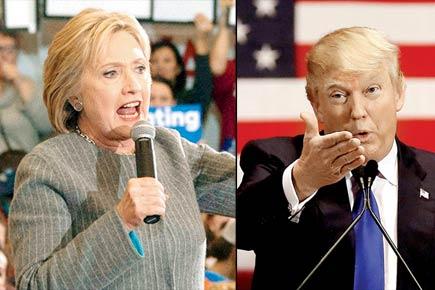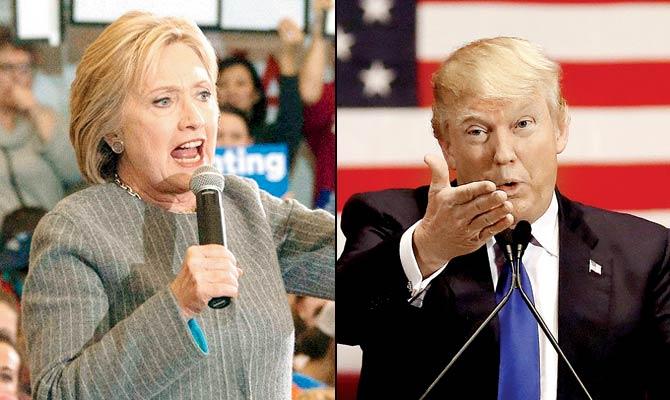With at least seven victories each in Super Tuesday's nomination contests across 12 states, Donald Trump and Hillary Clinton tightened their respective grips on the Democratic and Republican presidential nominations

Washington: With at least seven victories each in Super Tuesday's nomination contests across 12 states, Donald Trump and Hillary Clinton tightened their respective grips on the Democratic and Republican presidential nominations.
ADVERTISEMENT
But the brash billionaire's two main rivals managed to keep their hopes alive with Texas senator Ted Cruz winning his home state with the largest number of delegates and Oklahoma and Florida senator Marco Rubio landing his first win in Minnesota.

Hillary Clinton and Donald Trump
By midnight, Trump had won Alabama, Arkansas, Georgia, Massachusetts, Tennessee, Virginia and Vermont, while Clinton took Alabama, Arkansas, Georgia, Massachusetts, Tennessee, Texas and Virginia.
Bernie Sanders, Clinton's self-styled Democratic Socialist rival, captured Colorado, Oklahoma, Minnesota and his home state of Vermont.
"This has been an amazing night," said a triumphant Trump in a victory speech in Florida with his Tuesday's win stretching his lead in the Republican White House battle and underscoring his growing support across all sectors of the party.
Trump also predicted that he would win the Florida primary in two weeks against Rubio, who he called the state's "little senator" and a "lightweight".
Cruz cited his victories in Texas and Oklahoma coupled with his victory in the Iowa caucuses as proof that only he can actually beat Trump.
"After tonight, we have seen that our campaign is the only campaign that has beaten, that can beat and that will beat Donald Trump," he told supporters.
However, after notching his first win of the 2016 campaign in Minnesota, establishment favourite Rubio told CNN that he will move forward and doesn't believe Trump will win the nomination.
"This is the fight for the heart and soul of the Republican Party," he said. "I will go through all 50 states before we stop fighting to save the Republican Party from someone like that."
"What a Super Tuesday," Clinton said at a Tuesday night rally after victories in the South demonstrated her strength among African-American voters that could make it extremely difficult for Sanders to win the nomination.
But Sanders hoped to halt the Clinton tide with his four victories. "This campaign is not just about electing a president," he said at a rally on Tuesday night in Vermont. "It is about transforming America."
A total of 595 Republican delegates of the 1,237 needed to clinch the Republican nomination were up for grabs on Tuesday. Sanders and Clinton faced off for 865 of the 2,383 delegates needed to win the Democratic race.
Looking at Trump's triumphant run, the New York Times which has endorsed Clinton said: "The Republicans seem to be reeling, unable or unwilling to comprehend that a shady, bombastic liar is hardening the image of their party as a symbol of intolerance and division.
"The Republican Party is taking a big step towards becoming the party of Trump," it said suggesting that his main challengers Cruz and Rubio are "embracing the same game of exclusion, bigotry and character assassination."
The Washington Post also suggested that as "Trump rampaged through the Super Tuesday states", the Republicans "were adjusting to a new reality".
The disagreement between the Republican conservatives is not so much about whether Trump is acceptable, the Post said.
"It's whether he can be contained by being defeated, or whether he can be contained by being influenced as the party nominee who has brought an army of new, disgruntled voters to the polls."
 Subscribe today by clicking the link and stay updated with the latest news!" Click here!
Subscribe today by clicking the link and stay updated with the latest news!" Click here!






